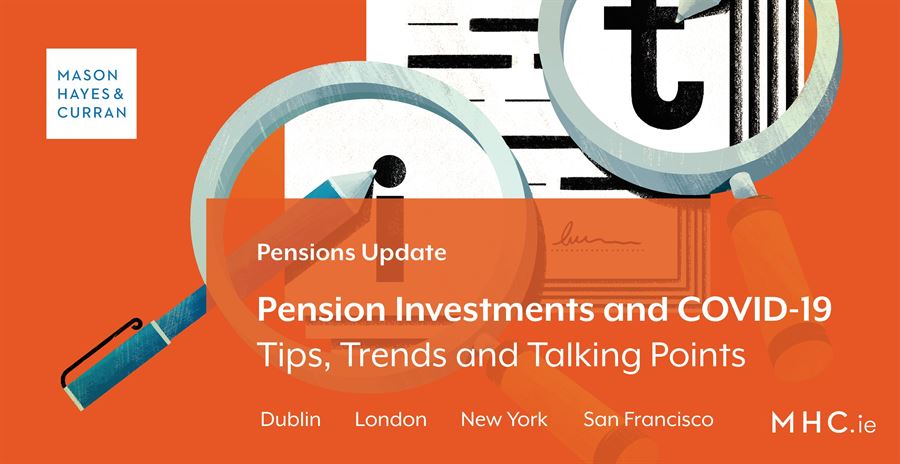Pension Investments and COVID-19: Tips, Trends and Talking Points

Many pension members approaching retirement will feel that the COVID-19 crisis could not have come at a worse time, as it has caused equity markets to tumble and bond yields to fall.
Those that are members of defined contribution schemes will have questions for trustees in respect of investment performance and switching, especially where their retirement benefits are invested in riskier funds that have a higher weighting in equities. Members of defined benefit schemes might be concerned about scheme funding and their employer’s continuing ability to fund the scheme. The pandemic has also produced some surprising results in terms of asset performance and the success of investment strategies based on Environmental, Social and Governance criteria. Here, we look at some of the issues facing trustees and members.
Investments for defined contribution schemes
Member concerns
While April saw the stabilisation of most of the major indices, February and March wiped billions from the value of pension investments. Those members of defined contribution (DC) schemes that are approaching retirement will have justified concerns about the value of their retirement benefits and the cost of purchasing an annuity, especially where they are invested in funds that are heavily weighted towards equities.
Stock market performance and asset classes
The fact remains that equity markets have performed very well over the past decade and this is borne out in an historical analysis of equity market returns. On average, a negative annual stock market return occurs about once in every four years, for instance, the average annualised return of the S&P 500 was c. 11.69% from 1973 to 2016. So while bear markets and black swan events might have a sudden, seemingly disastrous, effect on equities, they do recover and will often do so very quickly. Many DC scheme members will be invested in a fund that holds a diversified portfolio of assets which, while holding equities, will also hold bonds, property, cash and other alternative asset classes. Some of the assets within the portfolio will have a negative correlation with equities, meaning their value is likely to rise as equities fall. This means that while equity markets were tumbling in late February and early March, other markets and asset classes were doing very well.
Online portals and contacting your trustee
Many professional trustees and pension providers provide an on-line portal where scheme members can check fund or asset performances. Values are usually updated very regularly and the websites are, in the author’s experience, easy to navigate. If that is not possible then members can easily make contact with their scheme’s trustee or administrator.
Finally, it should be noted by members and trustees that the Pensions Authority has warned against knee-jerk decisions during the pandemic and has stated that investors should refrain from “making any immediate investment decisions unless absolutely necessary”. In an update published on 24 April, the Pensions Authority also reminded trustees of “their obligations to inform members of material changes to their pension benefits and should, where practicable, communicate with their members on recent developments in relation to members’ pension benefits during what can be a worrying time for pension scheme members”. In its 17 April statement, the European Insurance and Occupational Pensions Authority (EIOPA) also noted that occupational pension schemes, as long-term investors, can play a stabilising role in current volatile markets. This supports the Pensions Authority’s position on investment decisions during the pandemic.
ESG Performance
Detailed presentations on Environmental, Social & Governance (ESG) investment strategies and funds have been a consistent feature for asset managers over the past couple of years. Some questioned whether the rapid deterioration in asset prices would lead to many managers and investors abandoning ESG criteria and moving instead to assets such as gold and US treasuries, which are seen as traditional hedges in bear market conditions. However, ESG-scoring shares have outperformed others by c.7% since February and climate-focussed stocks have done particularly well, though this was partly attributable to the ongoing oil price war and oversupply. At the end of the first quarter the CEO of Blackrock, the world’s largest asset manager, released a letter where he stated “the pandemic we’re experiencing now highlights the fragility of the globalized world and the value of sustainable portfolios. We’ve seen sustainable portfolios deliver stronger performance than traditional portfolios during this period”. It has come as a surprise to many that ESG funds are performing well and delivering strong returns during the pandemic.
Conclusion
It appears that lessons from previous financial crises have been taken on board and investors are keen to avoid knee jerk financial decisions that have compounded previous meltdowns. As the EIOPA report has highlighted, pensions are by their very nature long term investments and as such impulsive investment decisions should be avoided. The resilience of ESG investments to date has been a pleasant surprise to many and one of the few positives that can be taken out of what is a very human tragedy.
For more information on the impact of COVID-19 on both pensions trustees and members, contact a member of our Pensions team.
The content of this article is provided for information purposes only and does not constitute legal or other advice.
Share this:




